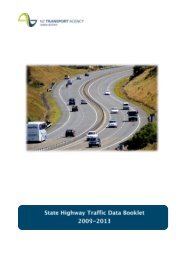resource-1-facts-and-figures
resource-1-facts-and-figures
resource-1-facts-and-figures
Create successful ePaper yourself
Turn your PDF publications into a flip-book with our unique Google optimized e-Paper software.
Resource 1 – Facts <strong>and</strong> <strong>figures</strong> Page 8<br />
What travel plans can achieve<br />
Do travel plans work?<br />
New Zeal<strong>and</strong><br />
The 2007/08 evaluation of ARTA’s workplace travel plan programme<br />
showed the programme is growing more rapidly <strong>and</strong> is resulting in fewer car<br />
trips to work than anticipated.<br />
‘Five workplaces have completed <strong>and</strong> evaluated travel plans, <strong>and</strong><br />
collectively have achieved a reduction of 355 car trips to work each morning<br />
peak. This reduction in car trips corresponds to 2.4 million fewer kilometres<br />
travelled, <strong>and</strong> a CO 2 reduction of 779 tonnes. The benefits of these five<br />
travel plans are at least 10 times the cost.’ 41<br />
Australia<br />
Employee surveys show that in most workplaces where a travel plan has<br />
been implemented, solo car commuting declined by an average of ten per<br />
cent in both Melbourne <strong>and</strong> Perth. 42 Some employers have recorded<br />
reductions of 30% or more, usually after changes to employer-provided car<br />
parking <strong>and</strong> active promotional efforts. Reductions in this range are<br />
consistent with experience in the UK. 43<br />
An evaluation of workplace travel plans in Australia found the following<br />
outcomes:<br />
Between 2001 <strong>and</strong> 2003, car trips in a Brisbane CBD engineering firm fell<br />
from 34% to 16%, <strong>and</strong> public transport use increase from 57 to 74% of all<br />
trips.<br />
The four Western Australian employers all recorded declines of 6–15<br />
percentage points in car trips for commuting, <strong>and</strong> some rises in walking,<br />
cycling <strong>and</strong> other green travel alternatives.<br />
In 2003, 19% of staff from The Alfred Hospital in Melbourne said they used<br />
the car less after the project, <strong>and</strong> 25% said they used public transport<br />
more. 44<br />
UK<br />
In the UK, ‘Experience from existing travel plans shows that for a well<br />
designed plan, a 15% reduction in car driver trips to site over about three<br />
years is a typical result’. 45<br />
41 Auckl<strong>and</strong> Regional Transport Authority. 2008. TravelWise programme evaluation 2008. Auckl<strong>and</strong>: Auckl<strong>and</strong> Regional Transport<br />
Authority [Held NZTA Library].<br />
42 Wake, David <strong>and</strong> David Meiklejohn. 2007. A tale of two cities: workplaces travel plan programs in Melbourne <strong>and</strong> Perth. Australasian<br />
Transport Research Forum (ATRF), 30th, 2007, Melbourne, Victoria, Australia. Vol. 30. page 8.<br />
43 Cairns, S, et al. 2002. Making Travel Plans Work: Research Report London: Department for Transport.<br />
44 Evaluation of Australian TravelSmart Projects in the ACT, South Australia, Queensl<strong>and</strong>, Victoria <strong>and</strong> Western Australia: 2001–2005: report to<br />
the Department of Environment <strong>and</strong> Heritage <strong>and</strong> State TravelSmart Program Managers. 2005. Canberra, Act: Australian Greenhouse Office,<br />
Department of the Environment <strong>and</strong> Heritage.<br />
45 Department for Transport. 2008. The Essential Guide to Travel Planning. London: Department for Transport, page 19, quoting: Making<br />
travel plans work: lessons from UK case studies, Department for Transport, 2002.<br />
www.dft.gov.uk/pgr/sustainable/travelplans/work/essentialguide.pdf (accessed 11 February 2010)



